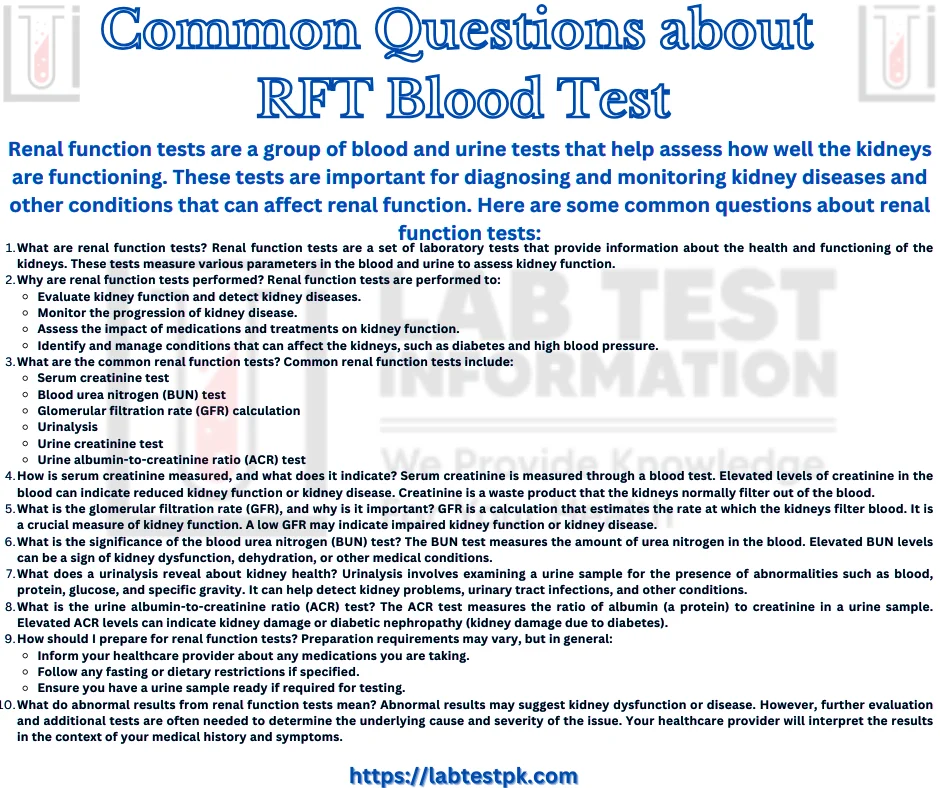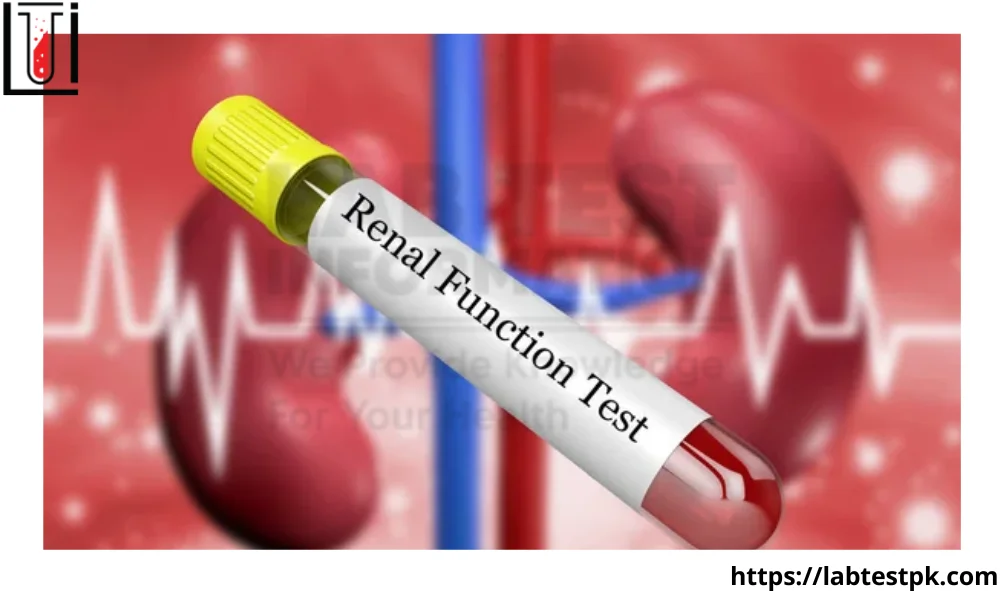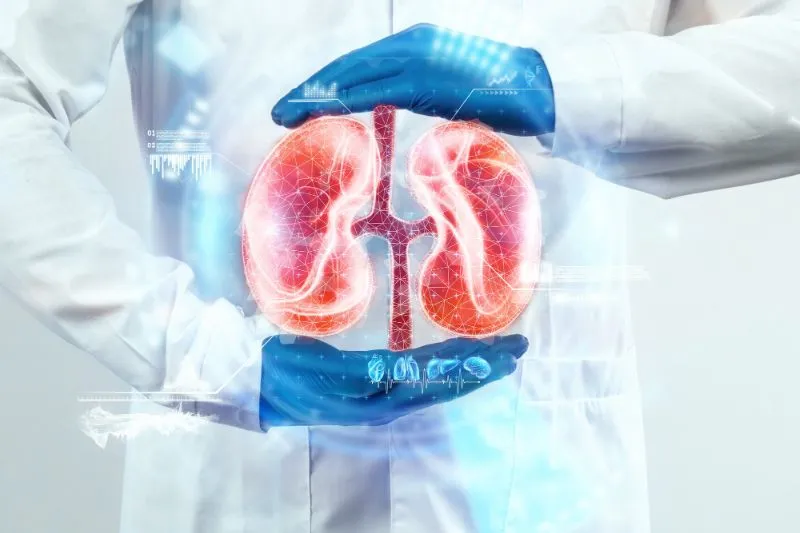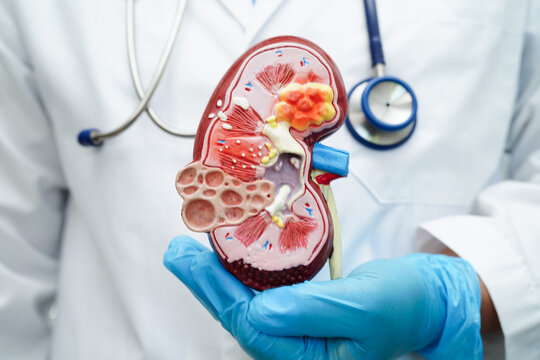RFT Blood Tests also known as Kidney Function Tests, are a group of medical tests that assess the functioning of the kidneys. These tests provide valuable information about the overall health and efficiency of the kidneys in filtering waste products and excess substances from the blood, maintaining electrolyte balance, and regulating blood pressure.
Key components of RFT Blood Test include:
-
Serum Creatinine
: Creatinine is a waste product generated by muscle metabolism. Elevated levels of creatinine in the blood can indicate impaired kidney function, as healthy kidneys should filter creatinine out of the blood and excrete it in the urine. -
Blood Urea Nitrogen (BUN)
: BUN measures the amount of nitrogen in the blood that comes from the breakdown of urea, a waste product produced by the liver. Elevated BUN levels can be a sign of kidney dysfunction or other medical conditions. -
Glomerular Filtration Rate (GFR)
: GFR is a calculated value that estimates the kidney’s filtering capacity. It is often considered one of the most accurate indicators of kidney function. A lower GFR suggests reduced kidney function. -
Serum Electrolytes
: Electrolytes like sodium, potassium, and bicarbonate are essential for maintaining the body’s electrolyte balance. Kidneys help regulate these levels, so abnormalities in electrolyte levels can be indicative of kidney problems. -
Urine Analysis
: A urinalysis can provide information about the composition of urine, including the presence of blood, protein, or abnormal cells. It can also reveal signs of urinary tract infections or kidney diseases. -
Albumin-to-Creatinine Ratio (ACR)
: This test measures the ratio of albumin (a protein) to creatinine in urine. Elevated ACR levels can be a sign of kidney damage, especially in individuals with diabetes. -
Creatinine Clearance
: This test involves collecting a 24-hour urine sample and a blood sample to calculate how much creatinine is cleared from the blood by the kidneys over 24 hours. It provides an estimate of kidney function. -
Imaging Studies
: In some cases, imaging tests like ultrasound, CT scans, or MRI may be performed to visualize the structure and size of the kidneys and identify any structural abnormalities.
Renal function tests are valuable for diagnosing and monitoring various kidney conditions, including chronic kidney disease, acute kidney injury, nephritis, and urinary tract infections. They are also used to assess the impact of medications and treatments on kidney function and to guide clinical decisions regarding the management of kidney-related disorders.
Purpose of RFT Blood Test:
The main purposes of renal function tests include:
-
Detecting Kidney Disease:
Renal function tests help identify early signs of kidney disease or dysfunction, even before symptoms become apparent. Early detection is crucial for timely intervention and treatment. -
Evaluating Kidney Function:
These tests measure the efficiency of the kidneys in filtering waste products and excess substances from the blood. Key parameters assessed include glomerular filtration rate (GFR) and creatinine clearance. -
Monitoring Chronic Kidney Disease (CKD):
For individuals with known kidney disease, renal function tests are used to monitor the progression of CKD and assess how well the kidneys are functioning over time. -
Assessing Kidney Damage:
Renal function tests can help determine if there is any damage to the kidney tissue. Elevated levels of certain markers, such as blood urea nitrogen (BUN) and serum creatinine, may indicate kidney damage. -
Evaluating Electrolyte Balance:
The tests measure the levels of electrolytes, such as potassium and sodium, in the blood. Abnormal electrolyte levels can be indicative of kidney dysfunction. -
Monitoring Medication Effects:
Some medications can affect kidney function, so renal function tests are used to monitor the impact of these drugs on the kidneys. This is especially important for patients taking medications with potential kidney-related side effects. -
Diagnosing Acute Kidney Injury (AKI):
Renal function tests can help diagnose AKI, a sudden loss of kidney function often caused by conditions like dehydration, infections, or medication toxicity. -
Preoperative Assessment:
Before surgeries, especially those involving anesthesia and contrast agents, renal function tests may be performed to assess the patient’s kidney function and reduce the risk of complications.
Low and High Symptoms of RFT Blood Test:
The results of these tests can indicate whether the kidneys are functioning within a normal range or if there are abnormalities that may require medical attention. Here are some low and high symptoms or indicators associated with renal function tests:
Low Symptoms (Abnormalities indicating potential kidney dysfunction):
-
Low Glomerular Filtration Rate (GFR):
GFR measures how well the kidneys are filtering waste from the blood. A low GFR suggests decreased kidney function. Symptoms and indicators of low GFR include:- Fatigue
- Swelling in the legs, ankles, or feet (edema)
- High blood pressure (hypertension)
- Increased levels of waste products in the blood, such as creatinine and urea nitrogen
-
Elevated Serum Creatinine:
Creatinine is a waste product that the kidneys normally remove from the blood. An elevated level of serum creatinine may indicate decreased kidney function. -
Elevated Blood Urea Nitrogen (BUN):
BUN is another waste product that can accumulate in the blood if the kidneys are not functioning properly. Elevated BUN levels may suggest kidney dysfunction. -
Proteinuria:
Protein in the urine (proteinuria) can be a sign of kidney damage or dysfunction. It may be detected through a urine dipstick test or a 24-hour urine protein test. -
Hematuria:
The presence of blood in the urine (hematuria) can be a sign of various kidney conditions, including infections, kidney stones, or glomerulonephritis.
High Symptoms (Normal or healthy renal function):
-
Normal GFR:
A GFR within the normal range indicates that the kidneys are effectively filtering waste products from the blood. -
Normal Serum Creatinine:
A normal serum creatinine level suggests that the kidneys are efficiently removing creatinine from the blood. -
Normal Blood Urea Nitrogen (BUN):
A normal BUN level indicates that the kidneys are effectively eliminating urea nitrogen from the blood. -
Absence of Proteinuria:
The absence of significant protein in the urine is a positive sign of healthy kidney function. -
Absence of Hematuria:
The absence of blood in the urine is another indicator of normal kidney function.
Why do I need a Renal Function Test:
A Renal Function Test, also known as a kidney function test, is a group of blood and urine tests that assess how well your kidneys are functioning. These tests are important for several reasons:
-
Detecting Kidney Disease
: Renal function tests can help identify early signs of kidney problems or kidney disease. Kidney disease often progresses silently, and symptoms may not appear until the disease is in an advanced stage. Regular monitoring of renal function is crucial for detecting kidney issues early when they are more treatable. -
Monitoring Chronic Kidney Disease:
If you have a known kidney condition, such as chronic kidney disease (CKD), renal function tests are essential for tracking the progression of the disease and determining the appropriate treatment and management. -
Evaluating Overall Health
: The kidneys play a vital role in filtering waste products and excess substances from your blood, maintaining electrolyte balance, and regulating blood pressure. Abnormal kidney function can lead to various health problems, including electrolyte imbalances, high blood pressure, and fluid retention. Renal function tests can provide insights into your overall health and help identify conditions that may be affecting your kidneys indirectly. -
Medication Monitoring:
Some medications can affect kidney function, and it’s essential to monitor kidney function if you are taking medications that may impact the kidneys. Renal function tests can help healthcare providers adjust medication dosages or switch to alternative treatments if necessary. -
Assessing Risk Factors
: Certain factors increase the risk of kidney problems, such as diabetes, high blood pressure, family history of kidney disease, and a history of kidney stones. Regular renal function tests can help identify individuals at higher risk and allow for early intervention and lifestyle changes to reduce that risk.
What Does The Renal Function Test Result Mean?
The interpretation of renal function test results depends on the specific tests performed and the values obtained. Here are some common renal function tests and what their results may indicate:
-
Glomerular Filtration Rate (GFR):
GFR is a key indicator of kidney function. It measures how effectively the kidneys filter waste and excess substances from the blood. A GFR value below 60 mL/min/1.73m² may indicate kidney dysfunction or chronic kidney disease (CKD). A lower GFR indicates more severe kidney impairment. -
Serum Creatinine:
Creatinine is a waste product generated by muscle metabolism and excreted by the kidneys. Elevated serum creatinine levels may suggest impaired kidney function. The degree of elevation can provide insights into the severity of kidney damage. -
Blood Urea Nitrogen (BUN):
BUN is a measure of the amount of urea nitrogen in the blood. Elevated BUN levels may indicate kidney dysfunction, dehydration, or other medical conditions. However, BUN levels can also be influenced by factors other than kidney function. -
Urinalysis:
This test examines the physical and chemical properties of urine. Abnormal findings, such as the presence of blood, protein, or abnormal cells, may indicate kidney disease, urinary tract infection, or other conditions. -
Albuminuria/Proteinuria:
The presence of excessive protein (albumin) in the urine may be a sign of kidney damage. Persistent proteinuria can be indicative of kidney disease, particularly in the context of other abnormal renal function tests. -
Creatinine Clearance:
This test measures the amount of creatinine cleared from the blood by the kidneys in a given period. It provides an estimate of GFR. A lower creatinine clearance may suggest reduced kidney function. -
Electrolyte Levels (e.g., Sodium, Potassium):
Abnormal levels of electrolytes in the blood can be associated with kidney problems. For example, elevated potassium levels (hyperkalemia) can indicate kidney dysfunction.
It’s important to note that renal function tests are not diagnostic on their own; they provide valuable information that must be interpreted in the context of your overall health, medical history, and clinical symptoms. If you receive abnormal renal function test results, your healthcare provider will use these findings, along with other tests and evaluations, to diagnose and manage any underlying kidney or health conditions.





[…] Vera (PV): This condition involves an excessive production of red blood cells, leading to thickened blood and an increased risk of blood […]
[…] Hematuria: Blood in the urine. […]
[…] with answers related to the Renal Function Test and Uric Acid test. Renal Function Tests (RFT) and uric acid tests are essential diagnostic tools in assessing kidney health and metabolic […]
[…] through vomiting and diarrhea, dehydration is a common concern with norovirus infection. Signs of dehydration include dry mouth, decreased urine output, and […]